God-sims aren’t exactly the most popular genre. The gameplay usually consists of the players ensuring the survival and success of a tribe or civilization, thus playing God.
Black and White is a God-sim that was developed by Lionhead Studios and released in 2001. Both gamers and critics praised it for its visuals and, for the time, advanced AI.
Black and White’s gameplay revolves around the player interacting with the world using an on-screen hand. Players can use it to manipulate objects or people inhabiting the world and perform actions like waking people by tapping their homes or casting miracles.
Through the players’ activities, the people below will judge their “God”; it’s up to the player whether they’ll be a Good god ushering in a utopia or an evil one ensuring a dystopic future. The player’s alignment also translates in the music of the game and the aesthetics of the world, a good God’s temple will be brightly lit, representing peace and prosperity, and an evil God’s temple would be scary looking.
It’s also noteworthy that it is not necessary to truly align yourself to an extreme. Instead, players can find a middle ground that would reflect the real world, where one could argue that events that transpire are sometimes good and sometimes evil.
As players make decisions for the tribe and help them expand the civilization, they’ll be guided by two advisors, one good one evil. The game’s main objective is to be worshipped by every village in the world; the main quest achieves this, but there are also side quests that exist to enhance God’s power further and enable them to cast more miracles.
Let’s look at other God-sims and perhaps find something a bit more modern. We’ve listed the best 7 games like black and white for you below.
| 1. Godus |
| 2. Populous The Beginning |
| 3. From Dust |
| 4. Dominions 5: Warriors of the Faith |
| 5. Crest |
| 6. Universim |
| 7. Reus |
1. Godus
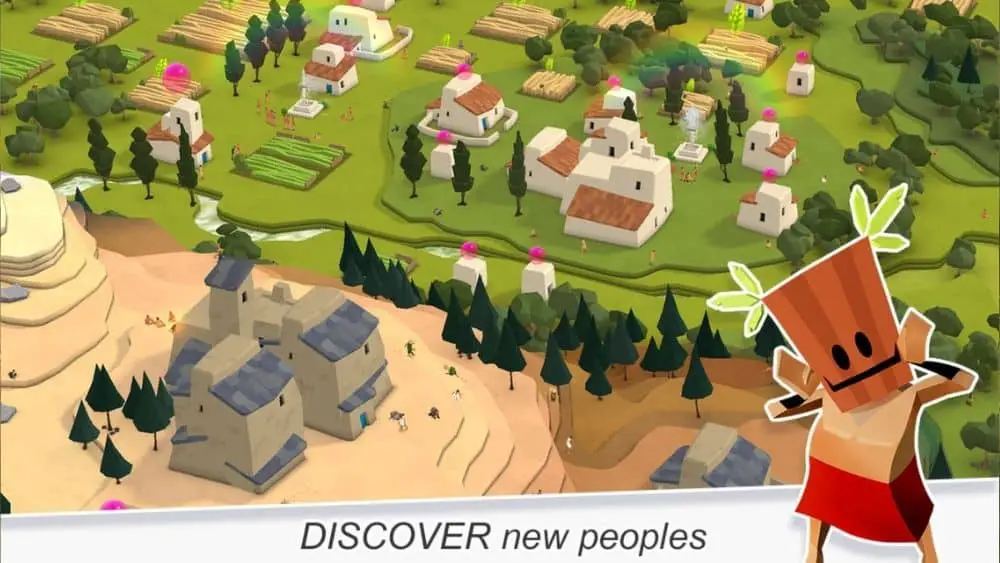
Oh boy, do I have trouble recommending a lousy game. Gamers call Godus a glorified mobile game PC-port. I don’t blame them; microtransactions are not something I like in the first place, but to place them in a paid PC game is outrageous.
Godus started as a Kickstarter campaign that met its funding in 2012; 9 years later, the game is still in early access. Reports suggest that the developer is not even focused on the PC port for now, which is a real bummer because this game has some real potential, especially looking at the Kickstarter promises.
The game begins with players saving a person from drowning; they would then be guided by their God to the promised land. The person would then start populating the area after building a tent.
The gameplay consists of increasing the population as time goes by; the increased population results in more believers, which in turn gives more power to the player in the form of cards giving players more powers to access.
It’s a shame that the game is in such a state because I enjoyed my time with it, barring, of course, the microtransactions and ridiculous waiting times. Seriously, sometimes I had to wait for over a day in real-time for a farmer’s production. Yeah, it’s that kind of game.
2. Populous The Beginning
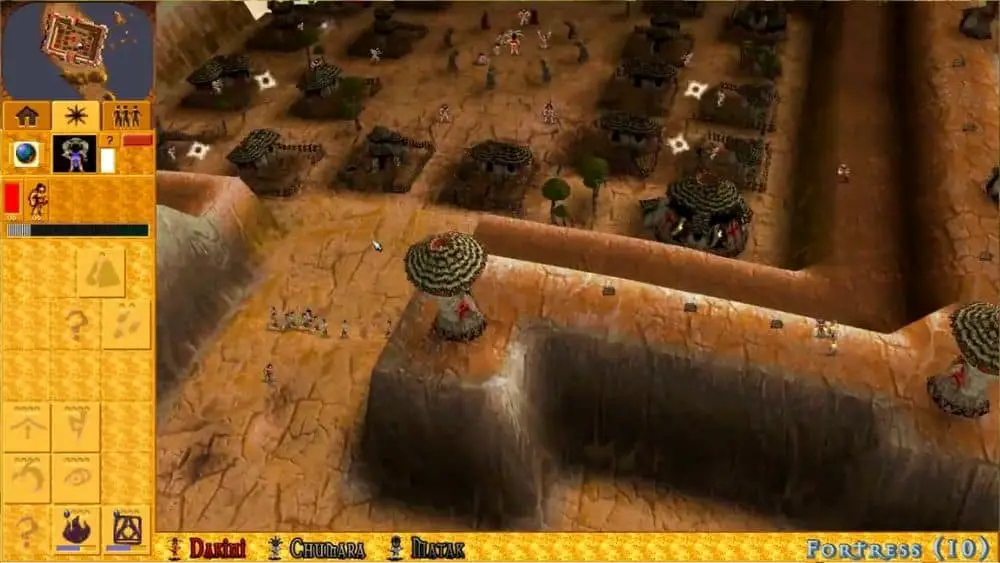
Released in 1998, Populous: The Beginning is the third entry in the series. The game is slightly different from other games in the genre because it starts with the player being a Shaman, not a god.
The world consists of twenty-five unnamed planets lived in by four different tribes, one of them being led by the player. The game’s goal is to defeat all other tribes’ shamen and be the only shaman to live, making her omnipotent.
The story plays out well with the players starting in the planet furthest from the Sun and making their way to the first planet in the system. Throughout the journey, players acquire new abilities, a small step towards Godhood at a time. The final level is a stand-off against all tribes together. It’s almost poetic.
Although it’s old, older than Black and White, it still has some interesting mechanics and focuses more on real-time strategy. For example, it is entirely possible to get the shaman killed or all her followers killed, which would result in an instant game over unless certain precautions have been taken. It’s a unique God-game but isn’t every one of them?
3. From Dust
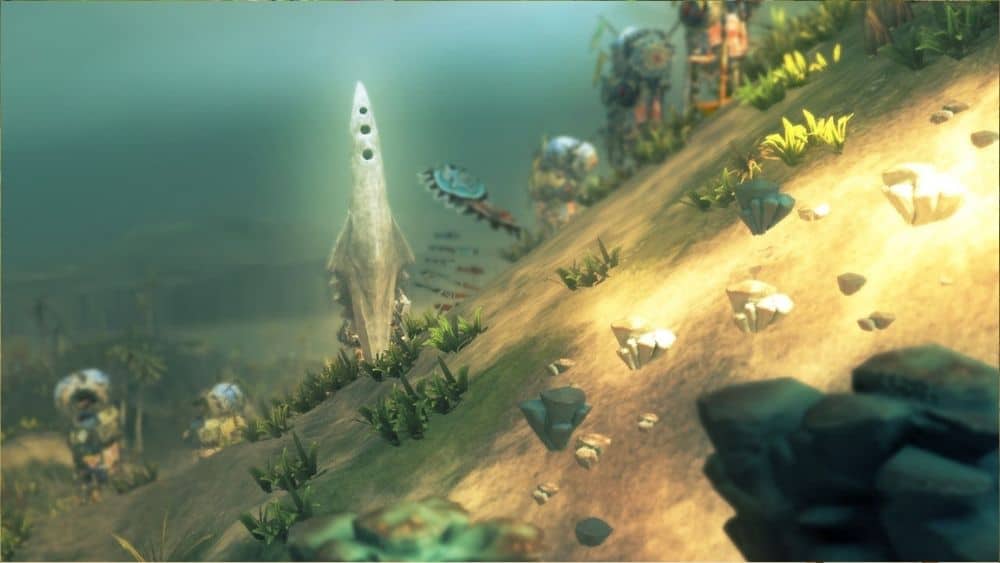
From Dust was described as a spiritual successor to Populous and was released in 2011. The game was reasonably well-received, with critics praising its smoothness and ease of control for a game of such grand scope.
The world consists of a nomadic tribe that inhabits a chain of islands; the player is tasked with helping the tribe find their path and help them seek their lost knowledge. The game is played in a first-person perspective which is a first for any God-sim.
In addition, players can manipulate matter in real-time, allowing them to change entire landscapes within seconds, cooling lava to solid rock, and allowing vegetation growth, which will come in handy for your tribe.
The game has a campaign very much like Populous wherein completing specific objectives influences the tribe’s progress, which grants players more powers that will help deal with natural disasters like earthquakes and tsunamis.
Apart from the primary campaign, the game offers challenge modes which are fast-paced puzzles without any narrative to go with them. As a result, From Dust is a no brainer for people who enjoy God-sims.
4. Dominions 5: Warriors of the Faith
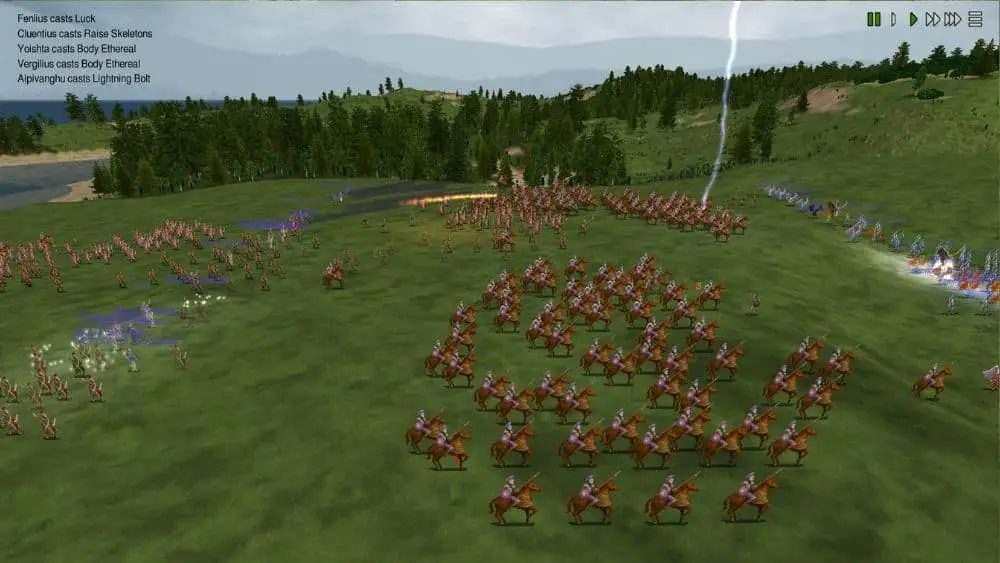
Dominions 5 is a God-sim that uses 4X turn-based mechanics for gameplay. The players control a pretender God as they amass an army of mages and commanders that will enable them to take over the world; with over 900 unique spells and magic items, Dominions packs a lot of content.
The game was developed and published by Illwinter Game Design and was released in 2017. It works as a very strategy-focused God-sim. Since the player is not a God, it doesn’t endow with a lot of power initially; however, slowly, players can unlock new abilities and spells gradually work their way to power.
The game even features a multi-player mode that looks pretty unorthodox at first but looking at the game and its turn-based system, it makes a lot of sense.
Multi-player uses a play by email system that allows players to play the game over days; this, in turn, provides diplomacy to be the strongest mechanic human players can use to ensure their survival or victory.
It’s not for everyone, but if you want a mix of strategy in your God-sim, Dominions is as close as it gets.
5. Crest
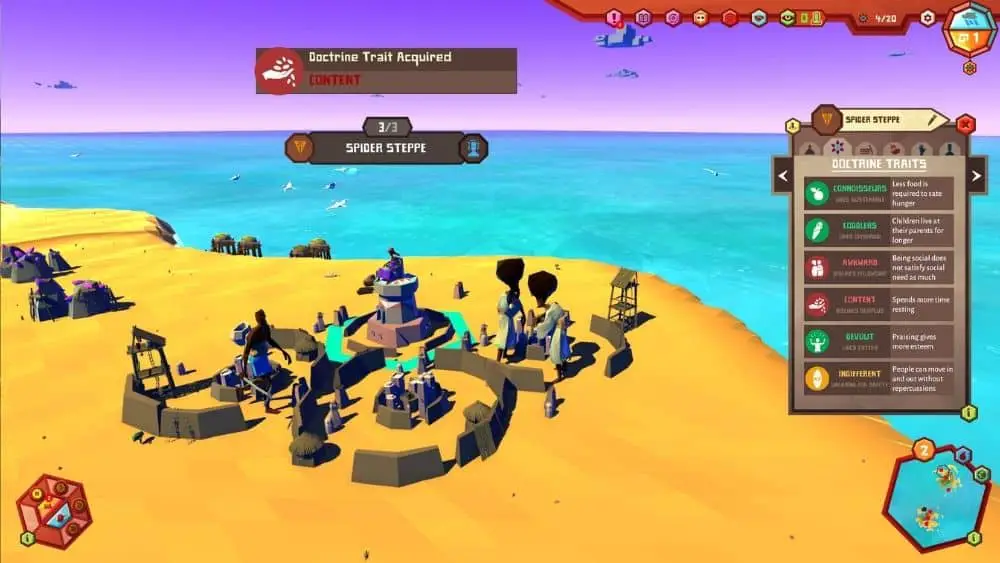
I wish Crest were in a better state than it is now; the game entered early access in 2015 and showed much promise with its gameplay and low-poly visuals that are very appealing to look at.
But, unfortunately, it’s not a great game. More precisely, it’s not a complete game, the developers haven’t updated it in a long time, and the content right now is very lackluster. Perhaps a 10-hour playthrough would be long enough to experience everything the game has to throw at you.
The game was officially released in 2018, and since then, the player base has not been thrilled with its abandoned state. However, if you enjoy watching simulations play out with very little in the way of gameplay, I think Crest is an excellent game for that. It might not have much content, but it still has its charm, and the visuals look pretty good for a small indie title.
It wouldn’t be fair to recommend any game that didn’t resonate with me, Crest does have many good ideas, but unfortunately, the developers didn’t see it through.
It’s more of a demo as it stands, not worthy of its full price, but perhaps can be grabbed at a sale. I hope the developer resumes work on this project cause it is a great game, just not realized yet.
6. Universim
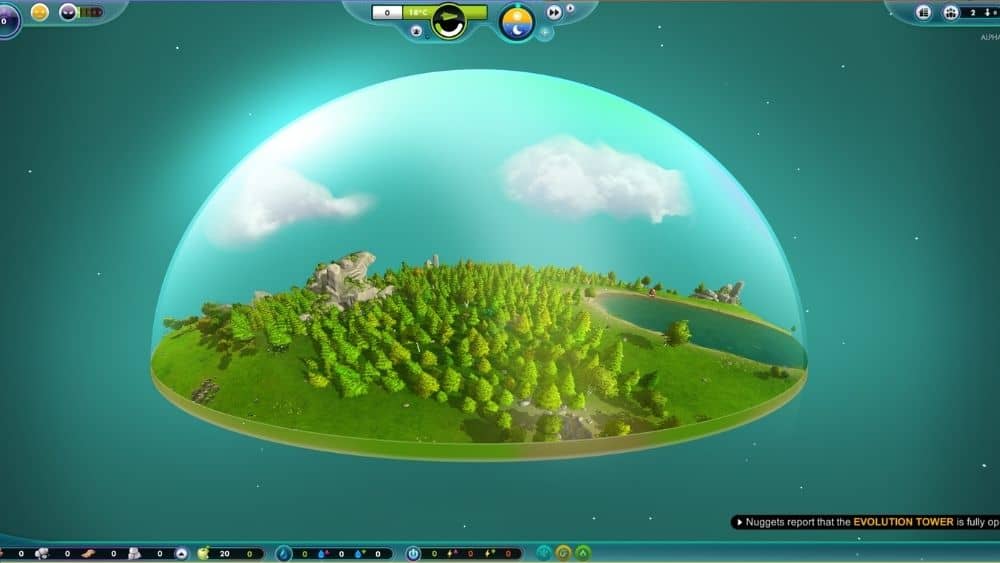
Universim is a God-sim that gives the players the responsibility of “Nuggets” (people) that players must guide from the stone age all the way to the futuristic space age. The game was released in 2018 in early access by Crytivo Games.
The Nuggets are intelligent beings capable of making their own decisions, and like the real world, this doesn’t bode well for God. Nuggets might start disputes or wage wars with fellow Nuggets; that’s bad business for any God.
The game allows intervention from the player; however, it’s important to note that complete control of Nuggets is not possible and the best the player can do is nudge them in the right direction. Further down the line in the space age, Nuggets might encounter alien species in the universe that might be hostile.
Players can influence the world using two elements – Power and Wrath. Power is accrued through successfully completing tasks, and it allows players to alter the planet like change the weather etc.
Wrath is slightly more interesting. When Nuggets fail to accomplish tasks, players will gain wrath, which they can unleash on the little Nuggets and scare them straight.
The Universim is overall a great game and a must-have for any God-sim lover.
7. Reus
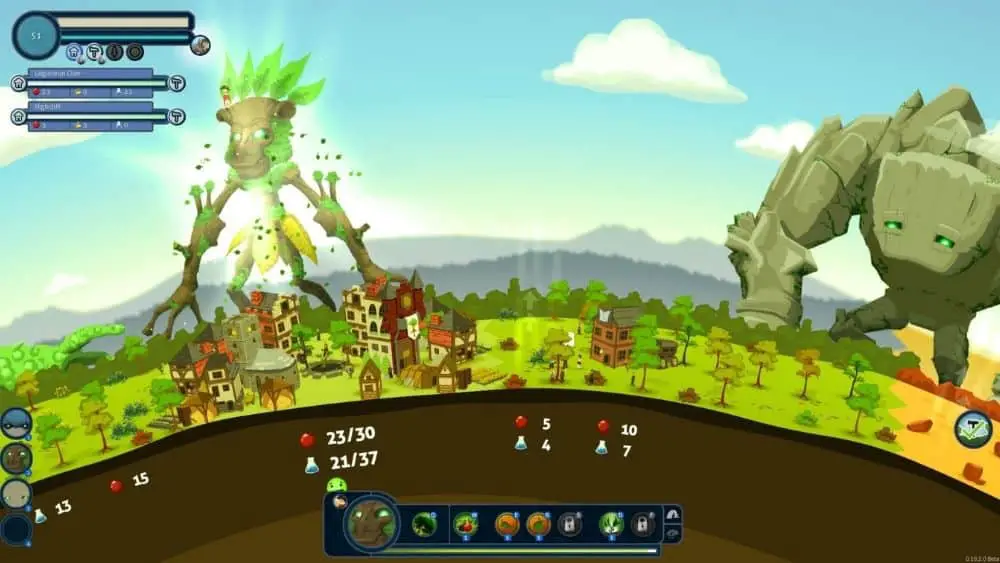
I remember enjoying Reus a lot when it was released. I liked its aesthetics and the veil of simplicity in its visuals that hid complex mechanics.
Reus was developed by Abbey Games and was released in 2013 for the PC, followed by console ports in 2016. The gameplay is as simple as it gets; players can control four elemental giants that work to structure a 2D planet inhabited by humans.
The goal of the game is to ensure the success of humanity using the powers of these giants as they spawn animals and minerals as resources for human beings to use.
The gameplay is simple at first, but there are layers of complexity in them; for example, if the player gives the humans too many resources, they might get greedy introducing conflict and chaos to the world. Therefore, every decision must be carefully measured lest it means the downfall of civilization.
Reus is an exciting game to play, and its easy to play nature coupled with unique aesthetics makes it an enjoyable experience. I’d recommend Reus to players looking to get into the genre as it is perhaps the best modern rendition of it.
Conclusion
I have always admired games like Age Of Empires, a strategy game that sees you directly control an entire civilization and lead them to victory via bloody battles and skirmishes.
God-sims/God games, however, take a different route by giving players control of things that most sim games let the system control and take away the control of the civilization, letting them decide for themselves how they wish to proceed to victory.
It turns the RTS genre to its head, giving players control where they never had, making for an engaging experience. Especially for someone like me who is used to playing RTS games, it’s nice to control resources every once in a while; how the AI chooses to use them, though, is usually always questionable.
Want to find out similar suggestions for other games as well? Visit our Games Like hub.


